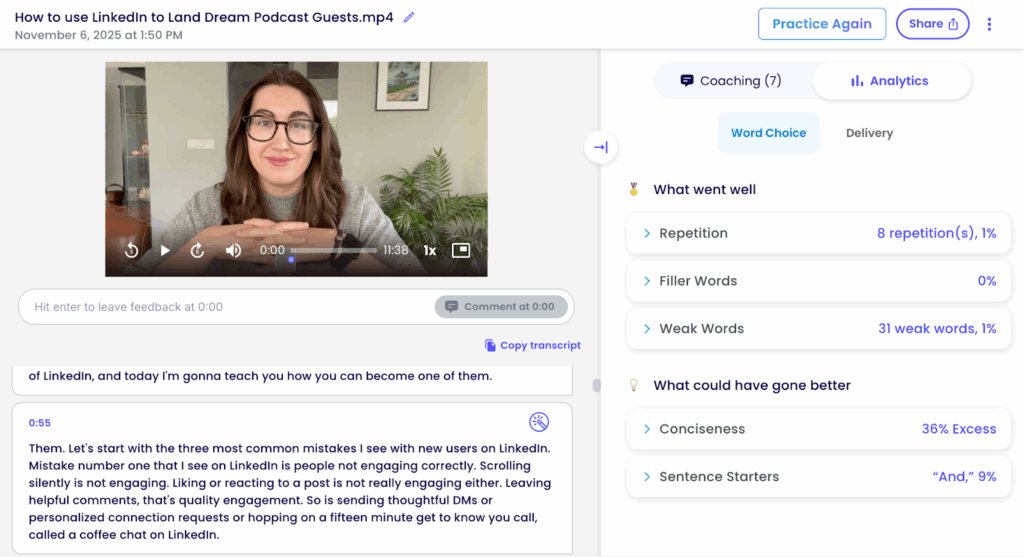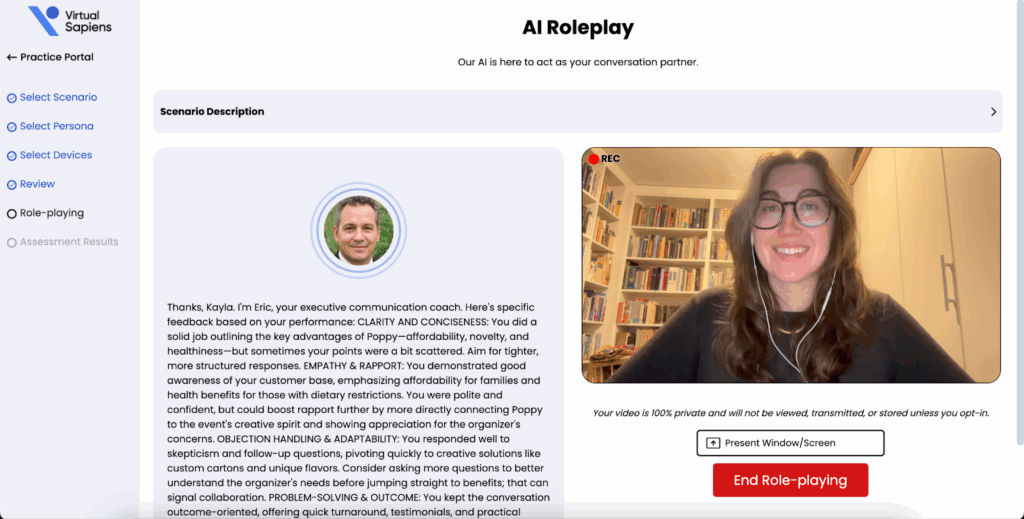From the first interview to your first boardroom presentation, strong speaking skills will open doors in your career. When it comes to strengthening these speaking muscles, AI can both help and hurt. Poor use of AI can omit your insights and undercut your skill development. But using AI as a communication tool, instead of a replacement, offers tangible benefits.
The market is saturated with AI tools promising every outcome imaginable. Let’s look at the top recommendations from a public speaking coach, plus the exact steps to take to measurably improve your communication skills using AI.
Start with your specific goal in mind
Before reaching for an AI speaking tool, Nausheen I. Chen, public speaking coach, professor and three-time TEDx speaker, encourages professionals to “step back and look at what great, impactful communication is.”
Chen breaks impactful communication down into these three factors:
Content: Is your message well-scripted and clear?
Speaking tools: How are your gestures, delivery and speaking speed?
Confidence: How confident do you feel and sound?
“Becoming a more impactful communicator in the workplace means you have to master all three,” shared Chen. “And the interesting thing is, AI can help us on all three.”
Content
The most obvious use for AI as a speaking tool is developing content like call scripts, presentations and meeting outlines. But Chen warns that using AI “out of the box” doesn’t quite work: The content is generic. AI speaks in its own voice without any reference to your personal experience.
The first step in using AI well is “training it first on your voice, on your background, and then brainstorming with it, using it as a partner to come up with the content.” For example, Chen has trained AI on her voice and uses it to help her draft scripts for 10 Instagram videos every week. “I’m working with AI,” she explained.
Tools like ChatGPT can be trained on your tone with samples of your writing, presentations, social media posts, videos and even emails. If you’re in a rush and training the AI model is too time consuming, try a flipped-interaction prompt instead. Tell ChatGPT what you’re trying to achieve, give it the role of a public speaking coach and let it prompt you to write your script.
Speaking tools
Good content is a solid foundation, but it alone doesn’t make you a great speaker. Speaking tools, like hand gestures and pacing, greatly impact how your message is received.
These elements sound intangible, but AI proves that this isn’t the case. With benchmarks on what’s expected in normal conversations, AI tools can extract analytics from your speaking samples. Using the tool Yoodli, you can have a real-time practice session or upload a video of yourself speaking to receive feedback and analytics on your strengths, weaknesses, and growth areas, including eye contact, pacing, pauses, filler words, repetition, weak words, conciseness, and sentence starters.
Yoodli can even provide speech analysis in real-time on video calls or presentations, though Chen warns that this can be too disruptive for some individuals. The tool points out when you’re speaking too quickly or not hitting your talking points, while remaining invisible to other attendees.

Confidence
Confidence in your delivery is built through practice, feedback and even facing your fears. “If I can come up with a well-thought-out, well-structured response to a tricky question when an AI is posing it to me, why can I not do it when I’m put on the spot by a human?” shared Chen. “Of course you can.”
For example, the AI tool Virtual Sapiens allows you to design interactive role play where you can select an angry or defensive conversation partner. You can prompt the AI agent to engage in a conversation that you’re nervous to have, like negotiating for a raise.
The agent asks questions, dynamically engages with your responses and poses specific follow-up questions unique to every practice session. After the session is complete, the virtual coach provides feedback and invites you to repeat the role play to measure for improvement. The AI models measure both verbal and nonverbal cues, helping you to practice and improve the conversation in a safe, feedback-oriented environment.
The AI agents can even switch languages, offering practice for people who work in a non-native language. But be warned: Some of the multilingual models still need fine-tuning. For example, when I tested a workplace conversation in Dutch, the AI coach’s pronunciation was unintelligible.

Start playing
Surrendering your voice, lived experience and creative process to AI is a costly shortcut. Instead, use AI to build excellent communication skills, from content development to speaking skills and confidence.
Professionals have never had easier access to this type of professional development. And speaker coaching isn’t just for thought leaders giving TED talks—good speaking skills open doors for every professional.
While there will always be immense value in human coaches, AI tools make this type of career investment much more widely accessible. Start playing with these tools yourself and feel how quickly AI can enhance your communication skills instead of atrophying them.
Photo by PeopleImages/Shutterstock








